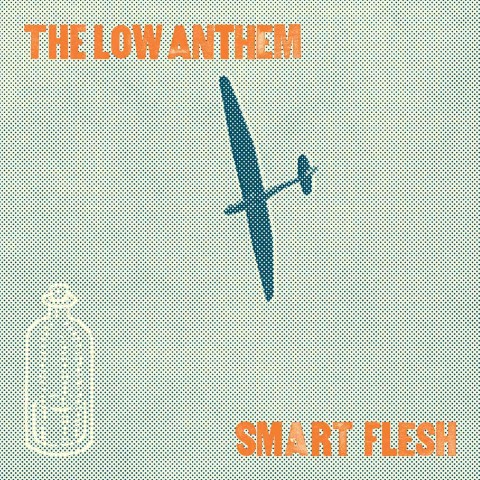
The first page of the liner notes for The Low Anthem’s Smart Flesh reads thus:
“The Low Anthem’s Smart Flesh is a credible, edible* collection of 11 songs. Softer than your velvet Elvis and fiercer than Lady Hate herself. Chapped, naked love songs, lazier than the drifting sun. Songs of fear, cruelty, and redemption. Songs on songs. Essence and nonsense. Frequencies for sympathetic architects. A church—a black hole—silence—exit music
for thunder. Oooweee! Herein: That bulbous, intelligent brain flesh of empty whales. That vacuous and monotonous flesh of the tumor. That taut flesh of the archer and his drawn bow. That trembling gut of the tightrope, that humming steel of airplanes. Woe that endless hunt. Woe ye embalmers of beauty. Woah! That tender and redeemed flesh… *For your ears only, with love.”
In 119 words, this sums up the album better than I ever could, but for your sakes I’ll give it a shot.
The Low Anthem’s first commercially-released album, Oh My God, Charlie Darwin, was something of a critics’ darling when it arrived on the scene in 2009. The Providence-based band has a sound that could be described as indie-, or perhaps chamber-folk, given the old-timey feel of their songs and the wide variety of instruments they use, many of them orchestral.
Smart Flesh, most of which was recorded in an abandoned pasta sauce factory in Central Falls, RI, doesn’t stray too far from this sound, perhaps because it doesn’t have to. There is something almost hypnotic about the Low Anthem’s songs; they are imbued with a kind of awe-inspiring honesty and reverence, both lyrically and melodically, as if they were recorded in some huge open space — sometimes it feels like a church, other times a front porch. This music isn’t performed for your benefit so much as letting you listen in on a secret.
The opening track, “Ghost Woman Blues,” encapsulates this feel, beginning the album unassumingly, with an easy grace that draws you in immediately. Then, the harmonies kick in and (especially on headphones) the clarinet and Harmon-muted trumpet start to play and that’s it – you’re in. It is followed by the country-tinged love song “Apothecary Love,” whose heavy waltz rhythm and seemingly outdated plot might deceive one into thinking that The Low Anthem are a band stuck in the past.
However, “Boeing 737” crashes right through that assumption. One of the album’s standout tracks, it begins with a lush, cinematic horn section backed by an insistent 4-on-the-floor beat — “I was in the air when the towers came down, in a bar on the 84th floor” sings lead singer Ben Knox Miller, with a ragged voice on the edge of a yell. Cinematic is the best word for this track as a whole, with references to Phillipe Petit (the “Man on Wire” from the 2008 doc of the same name) and an outro featuring the noise of flickering film. Yet the subject, of course, is a very real event.
The next few tracks are soft and slow, almost sacred-sounding songs. Pure falsetto harmonies and acoustic guitar, piano and upright bass, crisp harmonica solos, organ and harmonium all populate the instrumentation. The only instrumental track, “Wire,” is simply four minutes of three clarinets, moving between simple harmonies and complex counterpoint. There is something so ethereal about these three clarinets alone that makes one hold one’s breath, so as not to interrupt the performance. In contrast, “Burn” showcases Miller’s voice, backed very minimally by brushed drums, banjo, organ and even a saw at times.
After the somewhat silly “Hey, All You Hippies!” comes the naked emotion of “I’ll Take Out Your Ashes.” This is an impossibly melancholy song, where the “sad and guilty” narrator sings of not taking out the ashes of his dead loved one, of scrutinizing her “Alzheimer’s poetry” for any kind of answers. For all of the emotion, however, there is nothing overly dramatic or cloying. Mostly just two banjos backing the vocals, it sounds as if you simply happened upon this guy fooling around with a banjo on his porch, singing what he’s thinking about the one he loves. Then the song fades into the sound of a transistor radio, fuzzy with static. “Golden Cattle” features rich harmonies and some gorgeous clarinet counterpoint, before the final track, “Smart Flesh.” It begins with a count-off so close that (once again, especially in headphones) Miller sounds as if he is singing softly right into your ear, appropriate for the secrets being told and producing an effect similar to that of the way the album began. With his voice so close, you can’t help but hang onto every word as the lazy beat lulls you and pulls you in. •









